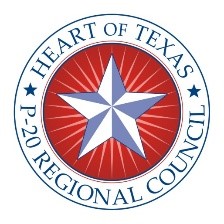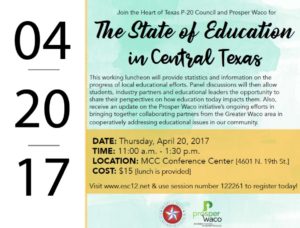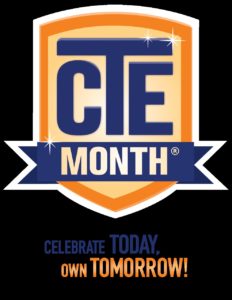(During December we will be reprising some of “2017’s greatest hits” from the Act Locally Waco blog. I couldn’t possibly pick my favorites – so I used the simple (cop out?) approach of pulling up the 10 blog posts that got the most “opens” according to our Google Analytics. It is an intriguing collection that gives at least a little insight into the interests and concerns of Act Locally Waco readers. I hope this “Top 10” idea inspires you to go back and re-read your personal favorites. There have been so many terrific ones… If you would like to see the Top 10 according to Google Analytics, here’s the link: 2017 Greatest Hits. Merry Christmas! — ABT)
By Kassidy Munden
After my first year of college, I began to realize there were things I really (and I mean really) wish I had known in high school to help make my transition to college smoother.
The first thing I would advise any high schooler would be to take the high school anatomy class. I didn’t think I would ever need anatomy in my future profession, or even have to take it in college, but I could not have been more wrong about that. High school students considering going to college should seriously consider taking an anatomy class. My biggest regret about not taking anatomy in high school was that when I got to college, I was far behind my classmates and didn’t know a single thing. You can imagine how well a 100-question test over blood flow in the body went for me three weeks into my freshman year.
 The second thing I would recommend for any high schooler would be to take dual credit in high school. Looking back on high school, that had to be one of the best educational decisions I made to prepare for college. Thanks to dual credit, I had all of my core English classes completed by the time I began college. Not only was it one less major class I had to take, I also learned how to properly write college papers. This helped me in my other classes as well, because in every class, even math, I had to write some type of proper essay. Knowing how to format and write these essays before my freshman year paid off in a huge way. I wish I had known to take more of the dual credit classes my high school offered, because even though they seemed difficult, they were more rewarding in the long run than they seemed at the time.
The second thing I would recommend for any high schooler would be to take dual credit in high school. Looking back on high school, that had to be one of the best educational decisions I made to prepare for college. Thanks to dual credit, I had all of my core English classes completed by the time I began college. Not only was it one less major class I had to take, I also learned how to properly write college papers. This helped me in my other classes as well, because in every class, even math, I had to write some type of proper essay. Knowing how to format and write these essays before my freshman year paid off in a huge way. I wish I had known to take more of the dual credit classes my high school offered, because even though they seemed difficult, they were more rewarding in the long run than they seemed at the time.
The third thing I wish I had known was to take the college transition class offered. Most high schools offer a college transition class and extend the class to all seniors. I did take this class, but I wish I had taken it more seriously. This class teaches students about life in college and how to live on your own, as well as educational enhancements such as how to build a resume. Looking back now, I wish I had learned how to build a proper resume, because that is something I will need for anything and everything. Most freshmen take classes requiring them to build a resume of some sort, and trust me, learning about it in detail in high school is easier than trying to learn it on your own in college.
The fourth and final thing I wish I had known was to get a job or internship. Most high school students declare their major “undecided” when entering their freshman year of college, which is completely normal. However, I wish I had explored more job opportunities and taken internships. These not only look great on a resume but also help you develop an idea of what you might actually want to get a degree in. Having more of a background in several different positions makes you a more diverse and knowledgeable individual. Did I mention it also will give you a stronger resume when you apply for college? That is key for all aspiring college students.
High school is a profound experience-building time for everyone, and I highly recommend that college-bound students seek out all of the opportunities available, because they definitely will pay off in the long run.
 Kassidy Munden is a summer intern at ESC Region 12 in the College and Career Readiness/CTE department. She is a student at Texas Tech University and wanted to share her wisdom with current high school students.
Kassidy Munden is a summer intern at ESC Region 12 in the College and Career Readiness/CTE department. She is a student at Texas Tech University and wanted to share her wisdom with current high school students.
By Dasjaevian Dixon
Searching for a job or an internship can be a tedious process. But researching and making genuine connections can help to ease that process. Last year, I utilized Eagle Network as a vital resource to find the Disney College Program internship, which is available for all students at the University of North Texas.
Eagle Network is an excellent resource for finding jobs, internships, and shadowing opportunities. After I found out about the Disney College Program, I researched the company and what it has to offer – not only to potential employees but for the millions of guests from all over the world who visit Walt Disney World annually. My excitement began once I learned that Disney was a Fortune 500 company that places great emphasis on guest satisfaction and opens doors for its interns’ occupational growth. After reading these descriptions, I knew the company would be a great fit for me.
I followed up with Disney’s recruitment team after applying to make sure an interview was secured. The interview lasted about 20 minutes. I was excited about the big break afterwards, but nervous regarding what to expect. After the over-the-phone interview, I sent a follow-up email expressing how thankful I was to even have the chance to be interviewed by a Disney recruiter.
I highly encourage all students to take advantage of resources offered from your school. Every interview will not be great. Every job you apply for will not be handed to you. However, you must stay persistent. Keep putting forth an effort to build and gain employment skills that will be vital to your eventual career of choice.
A great tool I would recommend in helping your job/internship search is LinkedIn. This unique social network for employers can mark the difference between an overlooked candidate and potential hire. I recommend using LinkedIn to reach out to as many professionals as possible.
My internship was a great learning experience overall, as well as a lot of fun. At the same time, I began it with several challenges – some of which came from simply adjusting to it. But that’s a part of every process, right?
It was difficult adjusting financially and physically when I arrived in Orlando, Florida, in April. It was also challenging to maintain a new schedule. Plus, I only had $300 dollars to my name. I had to use Uber numerous times to get around until I found someone who could provide transportation. Although most of my destinations were nearby, the money I spent on Uber accumulated quickly.
My normal routine consisted of attending classes, working, exercising, and socializing. That didn’t work out so well for the first 6 weeks of the internship. Before I knew it, I was working about 45 hours a week while taking 2 online classes through UNT. I couldn’t work out or socialize as much as I wanted to.
Working 6 days a week for about 2 months made me embrace time management more than I ever have. As much as it made me find a balance, it motivated me to improve my health to endure the long work days. I started cooking breakfast every morning and taking vitamins which helped tremendously. In return, I could get through the week without being so fatigued.
One thing I really looked forward to was volunteering alongside the Make-A-Wish Foundation as a wish granter. I knew Disney had a close partnership with the foundation, and I wanted to utilize that as a way to give back to the community.
Before passing away in July of 2007, my younger sister made a wish to attend a Ne-Yo concert while recovering from our bone marrow transplant. Her immune system was not strong enough for traveling, so Make-A-Wish made a way for her to attend a WWE event in San Antonio, Texas instead. She had the time of her life meeting some of her favorite wrestlers – especially her favorite, John Cena. He currently grants many wishes for children with life-threatening medical conditions.
I had my own chances to help grant wishes for 2 children in the Orlando area – in May and June respectively. Both of the families I interacted with were genuinely happy that their child would do something fun to aid them through challenging turmoil. Fortunately, I left both families’ homes feeling like I was a part of their units. It has been a wonderful experience being a part of the world’s largest wish granting organization. I look forward to continuing to serve in the North Texas region.
I’ve developed genuine relationships with people worldwide. Interacting and learning about different cultures with the international students I worked with was a blast. It strengthened my comprehension of how to communicate and made me eager to visit different countries.
At work, I was able to network with many people from different backgrounds. I did my best in making sure that guests felt comfortable and welcomed whenever they visited our store. I had the opportunity to engage in meaningful conversations that I will remember for the rest of my life. Throughout my internship, I interacted with thousands of guests and I am now more comfortable when speaking to large audiences or individuals that I’m meeting for the first time.
As a young professional, I’ve sharpened valuable skills which make me an important asset in the business field. Some of those skills include being personable, practicing effective communication, identifying problems, and providing ample solutions. Now, I can find a perfect balance between hard work and participating in extracurricular activities.
Most importantly, I still enjoyed the recreational activities Walt Disney World offered. On my off days, I visited theme parks and traveled around Florida. Being in this enlightening atmosphere every day has inspired me to continue working hard and enjoying the treasures of life. I am beyond thankful for this opportunity and experience. Thank you and best regards to everyone who continues supporting and encouraging me on this formative professional journey.
 Dasjaevian Dixon is an undergraduate student at the University of North Texas studying Marketing with a double minor in Decision Sciences and Psychology. He is currently interning at Walt Disney World in Orlando, Florida. Dasjaevian is a Brazos Education Foundation scholar. He currently serves as the Vice President for The Presidential Men, an organization he helped implement at UNT. He also assists with helping grant the wishes of children with life-threatening medical conditions for the Make-A-Wish Foundation. Owning his own business in the future is one of his top goals. As a millennial, he is building on his personal and professional skills to become a valuable asset in the business field.
Dasjaevian Dixon is an undergraduate student at the University of North Texas studying Marketing with a double minor in Decision Sciences and Psychology. He is currently interning at Walt Disney World in Orlando, Florida. Dasjaevian is a Brazos Education Foundation scholar. He currently serves as the Vice President for The Presidential Men, an organization he helped implement at UNT. He also assists with helping grant the wishes of children with life-threatening medical conditions for the Make-A-Wish Foundation. Owning his own business in the future is one of his top goals. As a millennial, he is building on his personal and professional skills to become a valuable asset in the business field.
The Act Locally Waco blog publishes posts with a connection to these aspirations for Waco. If you are interested in writing for the Act Locally Waco Blog, please email [email protected] for more information.
by Carrie Arroyo
Summer is my time to relax, eat too much ice cream, run through the sprinkler in the front yard with my kids, and watch the hummingbirds eat from our Turk’s Cap off the front porch. But because I work on a school calendar schedule and have 3 youngsters who will all be in school this fall, it is impossible to escape the inevitable hanging over our heads: school is only 1 month away! Sorry to bring it up and crush your dreams of endless fire fly chasing at dusk, but I do have some suggestions that will help ease the transition back in to school and contribute to a successful school year for kids, families, and teachers alike.
 We would love to silo academic success as only being influenced by the amount of study time, quality of textbooks and teaching skills, and intellectual capacity. But the reality is that it is also directly influenced by our physical, mental, and social well-being. Our mental wellness is a key component to achieving academically. Wellness requires the active pursuit of health instead of treatment of illness. When we build wellness practices in to our lives, we are building up our reservoir of mental resources so that when stressful and challenging times hit, we have an ample supply of mental energy and flexibility to withstand added demands. Mental wellness also helps us to flourish in our daily lives. And if we want our children to succeed and flourish in school, there are few things we can do to help them pursue mental wellness. (flower)
We would love to silo academic success as only being influenced by the amount of study time, quality of textbooks and teaching skills, and intellectual capacity. But the reality is that it is also directly influenced by our physical, mental, and social well-being. Our mental wellness is a key component to achieving academically. Wellness requires the active pursuit of health instead of treatment of illness. When we build wellness practices in to our lives, we are building up our reservoir of mental resources so that when stressful and challenging times hit, we have an ample supply of mental energy and flexibility to withstand added demands. Mental wellness also helps us to flourish in our daily lives. And if we want our children to succeed and flourish in school, there are few things we can do to help them pursue mental wellness. (flower)
5 Tips for Increasing Mental Wellness at School
1. Focus on learning over perfection. My 9-year-old is wired in such a way that he hates to try something new unless he is 100% sure he is going to be able to master it quickly. One of the first times this became obvious was when he was learning to tie his shoes when he was 4. In an effort to get him to persist in this new and challenging task, we mandated mistake-making. He was required to make at least 5 mistakes and we celebrated wildly with claps, cheers, and dance parties every time he messed up. This made him laugh and loosen up and be willing to keep trying (and keep messing up) until he mastered the task. The focus in school performance too easily becomes the grade that comes home on the paper or report card. Instead of rewarding or punishing the grade, focus on rewarding and reinforcing the learning. We need to cultivate this culture and build in an expectation of curiosity and experimentation that feeds creativity. Kids need to know that they are safe to make mistakes and that the classroom and their families will still accept them and appreciate them for what they bring to the learning process.
2. Connection, Belonging and Trust. As much as teachers would like to think it’s true, very few students wake up excited to go to school in order to learn a new algebra equation. When I ask my kids about their most memorable moments of the school day, they usually center around an interpersonal interaction. Whether it was a game they played on the playground with friends or a hug they received from their teacher, they feel energized by points of connection throughout the day. These moments of attention to who they are as individuals and appreciation of their presence, are little deposits in to the mental wellness bank. And when they are feeling positive about themselves and their school environment, their ability to learn that new math fact increases exponentially.

Picture of my son Ezekiel and his Kindergarten teacher Mrs. Draper on the first (left) and last (right) day of school in 1st grade. From fear and apprehension, to love, acceptance, and success!
3. Be Proactive and Limit Surprises. I love a good surprise. One of my biggest pet peeves is someone telling me the ending of a book or movie before I have had the chance to experience it myself. However, there are some situations where limiting surprises can help our minds, hearts, and spirits to thrive; and school is one of these situations. For families, be proactive and visit your child’s school ahead of time: meet key people, find the cafeteria and bathrooms, walk your class schedule before bells are ringing and other people are bumping in to you. For schools, minimize complications for families and students: have clear signs and make sure procedures are easy to find and follow. Streamline things as much as possible. Clear and consistent communication helps to clear up a multitude of misunderstandings and can make the school environment much more inviting to students and families. So caregivers, don’t stop surprising kids with unexpected notes of encouragement in their lunch boxes such as “Good luck on your science test” or “I hope you have a great day” and teachers, don’t stop giving the surprise gift of dropping the lowest test grade at the end of the grading period, but also make sure you give plenty of information and guidance up front to demystify the experience.
4. Routine helps children’s brains navigate the world. As they experience new things, their brains sort the information, assimilate it in to their thinking process, and adapt and grow as they learn new things. Providing structure to a child’s day helps them to thrive. This starts at home before they come to school with adequate sleep, a good morning greeting, and a hug before they walk out the door. Building in routines that give attention to physical needs is also directly tied to mental wellness. Kids need to eat well, be sufficiently hydrated, and get some exercise. Moving the body can do wonders for opening up the mind and being ready to learn. Building brain breaks in to the routine keeps the mind flexible and responsive to the learning environment.
5. Focus on what works. The ‘power of positive thinking’ is not just an old phrase; it is actually helpful to build up our mental wellness. Our brains tend to repeat the things that we focus on the most. If we are constantly focusing on what a child has done wrong and giving attention to it, it is actually more likely to increase. Telling kids what we want to see and encouraging positive behaviors increases the likelihood of positive behavior and habits. When something goes wrong, offer the child the opportunity to redo a mistake. I know this can be hard for those of us who grew up thinking the best way to train a child is to be hard and strict with more of a “get it right the first time or else” approach. But what we know from research is that we remember what we do – whether that is doing it wrong or right. Take the time to give a child the opportunity to redo an action they originally got wrong so that their motor memory can store the right way to do it. It will increase the likelihood that they will get it right the next time. Yes, it takes time, but is time well spent. And at the end of it, the adult and child are both celebrating a success rather than fuming over a mistake. This builds a more connected and collaborative relationship by increasing positive thoughts and feelings.
 Carrie Arroyo works hard as a Lecturer in the Diana R. Garland School of Social Work at Baylor University where she teaches soon-to-be social workers and coordinates the BEAR (Be Emotionally Aware and Responsive) Project with Waco ISD. She also plays hard as a mom of 3 energetic kids: Jonas (9), Ezekiel (7) and Eden (4) and wife to Fernando in their North Waco neighborhood.
Carrie Arroyo works hard as a Lecturer in the Diana R. Garland School of Social Work at Baylor University where she teaches soon-to-be social workers and coordinates the BEAR (Be Emotionally Aware and Responsive) Project with Waco ISD. She also plays hard as a mom of 3 energetic kids: Jonas (9), Ezekiel (7) and Eden (4) and wife to Fernando in their North Waco neighborhood.
By Christine Holecek
 The mission of the Heart of Texas P-20 Council is to assist with the collaboration of education, business, and community to maximize the utilization of resources, programs and services for all students while encouraging a culture of life-long learning. We envision that all students can reach their true potential as happy, healthy, productive and self-sufficient citizens.
The mission of the Heart of Texas P-20 Council is to assist with the collaboration of education, business, and community to maximize the utilization of resources, programs and services for all students while encouraging a culture of life-long learning. We envision that all students can reach their true potential as happy, healthy, productive and self-sufficient citizens.
We believe that achieving college and career readiness allows students to reach their fullest potential. Continual improvement of teaching and learning processes is a key ingredient to success. We also believe that the economic vitality of the region is interdependent, requiring the collaboration of education, business, and community resources.
Below is the HOT P-20 profile of a high school graduate. It is meant to encourage dialogue between students, teachers, counselors, parents and community members in planning for college career and beyond. The HOT P-20 Council, through the *AVATAR Project (a project that invites high school teachers/counselors to meet with Higher ed teachers/counselors to coordinate their work) has adopted this profile utilizing a document created by Waco ISD several years ago. This document provides talking points and suggestions. This document is a work in progress and will be updated annually as part of the HOT P-20 Regional Council strategic.
Profile of a High School Graduate
A responsible decision maker
- Who uses creative problem-solving and conflict resolution kills effectively
- Who uses critical thinking, knowledge and reasoning to effectively evaluate information and make sound decisions
A confident life-long learner
- Who demonstrates mastery of skills in the core content areas
- Who analyzes, evaluates, and applies new information
- Who is an inquisitive self-learner
A healthy individual
- Who practices emotional and physical wellness, including nutrition, hygiene, sexual responsibility, and physical fitness
- Who demonstrates responsible life management skills in social, interpersonal and family relationships
- Who manages time, money, environmental and other resources in a responsible and effective manner
A literate communicator
- Who is proficient in academic and technological skills
- Who effectively expresses ideas using a variety of methods, including written and spoken languages, mathematics, science and the arts
- Who is multilingual
- Who uses appropriate social and interpersonal skills to effectively communicate in a global society
An informed citizen
- Who promotes democratic principles in a multicultural society
- Who demonstrates patriotism and citizenship through community service and participation in the democratic process
- Who understands, respects, and values all cultures
A productive worker
- Who generates quality goods and services
- Who demonstrates adaptability
- Who practices a good work ethic
- Who demonstrates leadership and participation skills
- Who takes ownership of his/her future through goal setting, decision making, and efforts aimed at continual improvement
A well-rounded individual
- Who is guided by honorable values, morals, and ethics
- Who demonstrates an appreciation of, and participation in, the arts
- Who displays genuine global, cultural, and spiritual awareness and respect
- Who is accountable for his/her actions
If you would like to get involved in the conversation or join our initiatives contact our new chair for 2017-2018 school year, Dr. Scott McLanahan. He can be reached at [email protected]. Initiatives for 2017-2018 include Vertical Alignment (AVATAR project), Groundhog Job Shadow Day, Waco ISD/Prosper Waco Internship Program and the Annual State of Education Conference. For more information on the HOT P-20 council: www.hotp20.org.
 This Act Locally Waco blog post was written by Christine Holecek. Christine is an Education Specialist at Education Service Center Region 12 in Waco. She has worked in the area of Adult Education and Career & Technical Education for the past 25 years. She earned an AAS degree from MCC, a BAAS and Master’s Degree from the University of North Texas and is currently enrolled in the Doctoral Program in Educational Leadership and Policy Studies at Tarleton State University.
This Act Locally Waco blog post was written by Christine Holecek. Christine is an Education Specialist at Education Service Center Region 12 in Waco. She has worked in the area of Adult Education and Career & Technical Education for the past 25 years. She earned an AAS degree from MCC, a BAAS and Master’s Degree from the University of North Texas and is currently enrolled in the Doctoral Program in Educational Leadership and Policy Studies at Tarleton State University.
The Act Locally Waco blog publishes posts with a connection to these aspirations for Waco. If you are interested in writing for the Act Locally Waco Blog, please email [email protected] for more information.
By Fred Hills
Preparing local students for successful journey through school and college to careers is critical to the well-being and growth of our community. Started 8 years ago, the HOT P-20 works to promote streamlined, transparent degree pathways for students to move quickly and successfully through their education and onto college and/or a career. The Heart of Texas (HOT) P-20 brings together representatives from the independent school districts (ISD), institutions of higher education (IHE), Region 12 Education Service Center, industry and government across six counties: Bosque, Hill, Falls, Limestone, Freestone and McLennan to work towards this goal. Among the higher education representatives are McLennan Community College, Texas State Technical College, and Hill County with representation from both Tarleton State University, Texas Tech through MCC’s University Center.
The HOT P-20 mission can best be summarized as follows:
- Collaborating by building cross-community team to address education and career possibilities for all students.
- Informing our diverse communities about ongoing initiatives, best practices and available resources.
- Advocating for educational best practices with at the state and local levels.
Some of our ongoing projects include:
- Academic Vertical Alignment Training and Renewal (AVATAR) program that brings together faculty from the high schools and post-secondary institutions who teach Math, English, College and Technical education, and STEM to discuss differences in instructional techniques and ways to better prepare students for college-level work while in high school. AVATAR also include high school and college counselors to address ways to better advise students in preparation for their transfer to college and/or a career.
- Building closer ties between education and industry under our Groundhog Job Shadowing initiative celebrated on February 2 each year promoting job shadowing, internships, externships, career fairs and industry visits.
- Partnering to support local educational initiatives and programs such on Region 12 ESC’s Connect 3, Teacher’s Gone Tech, Girls in STEM, career fairs, etc.
- Building collaborative agreements among secondary, post-secondary and industry to offer degree pathways and college preparation courses for students while still in high school.
 Providing an annual forum on “State of Education in Central Texas” in the Spring to share ongoing educational initiatives and career preparation opportunities. This year’s event is scheduled for April 20 from 11:30 to 1:30 PM at MCC’s conference center. All are welcome.
Providing an annual forum on “State of Education in Central Texas” in the Spring to share ongoing educational initiatives and career preparation opportunities. This year’s event is scheduled for April 20 from 11:30 to 1:30 PM at MCC’s conference center. All are welcome.- Working with Prosper Waco and the Waco Chamber to inform them on ongoing educational initiatives and promote education to career programs.
- Surveying the community for ways to better serve all partners in this effort.
HOT Regional P-20 operates as a voluntary organization. For more information on the HOT P-20 and its programs, check out our webpage at http://www.hotp20.org
 Dr. Fred Hills is the current president of the HOT P-20 and Dean of Arts, Science and Business at McLennan Community College. He has worked and lived in the Waco community for over 20 years and has served on the HOT P20 for the last four years.
Dr. Fred Hills is the current president of the HOT P-20 and Dean of Arts, Science and Business at McLennan Community College. He has worked and lived in the Waco community for over 20 years and has served on the HOT P20 for the last four years.
The Act Locally Waco blog publishes posts with a connection to these aspirations for Waco. If you are interested in writing for the Act Locally Waco Blog, please email [email protected] for more information.
By Hermann Pereira
When I entered into the education field 10 years ago I thought to myself, “Next year I will find a real job…” I had studied business administration at Stephen F. Austin and thought the corporate world was where I wanted to spend my career. We had moved to Waco and I figured teaching would be easy. Boy, was I wrong! Being an educator was challenging and rewarding and I was hooked early on. I followed my wife into the profession after I saw the influence she had in the classroom and as a coach. I wanted to do the same for students that looked like me and ones that came from blue collar families like me as well. I found my motivation to impact young people’s lives early in my teaching career at West ISD. Then, as I began working at Connally ISD, I realized my motivation to impact others needed to be broader. That led me to Baylor University where I earned my Master’s degree in Educational Administration.
I have been blessed to lead the team at Connally Career Tech for the past year and it has been one of the most rewarding things I have ever done. We have had success in a short amount of time and I think that all boils down to a few key ingredients: motivation and partnerships.
Motivation is key
More than three years ago Connally ISD decided to think outside of the box. They created Connally Career Tech Early College High School. Leaders at Connally were motivated to serve the students at Connally ISD in a unique way because the reality is not every student has the desire to attend a 4-year university. We are a school within a school model, which means students can experience high school sports and activities and attend college classes. One important feature of our campus is that all tuition, books and supplies are free to the families so cost is not a barrier to students. All students from Connally High School can apply to be a part of our campus if they have the desire to enter into one of our career clusters. Those clusters consist of Construction, Computers, Criminal Justice, Drafting, Healthcare, Manufacturing, Technology, Transportation Technology or Visual Communications. Once students show an interest in these fields we educate them on what types of opportunities they may have if they study one of these fields.
Students are learning hands on career skills in a certain field as well as soft skills that will help them to become the very best in their chosen industries. We have seen that once students begin working in an industry for which they feel a passion, their motivation will push them to achieve more than they would have ever imagined. Students receive extra support and guidance in a “small school feel” from teachers and faculty due to the Early College High School (ECHS) model that we follow. Some students will finish with college hours in a career field, some will complete certifications or an Associate’s degree in a certain field. Either way they are realizing that these opportunities are generation changers.
Partnerships
Connally ISD is fortunate to be part of the greater Waco area which is filled with people, companies, higher ed institutions and other organizations that are ready and willing to partner with the efforts of all schools. For schools like ours, that make college hours available to students, it all begins with our higher education partners. Texas State Technical College was the first college partner that opened its doors and made its programs available to our students. On TSTC’s Waco campus, Connally Career Tech students are able to earn certificates and Associate’s degrees in high demand technical fields. Our students are able to learn from the best professors and are able to experience top notch facilities in these different fields. Our focus on career readiness also led us to a partnership with McLennan Community College that will kick off this upcoming fall. With this new partnership Connally Career Tech students will be able to choose from a number of public service careers. Our students will have the opportunity to earn certificates and possibly Associate’s degrees in industries such as health care and emergency service fields. Recruiting is almost over for next school year and we have had a great deal of interest from families about our new career offerings.
In a short amount of time we have found that members of the community are eager to partner with us to help create more well-rounded, career driven students. So far we have relationships with large companies, small local businesses, and nonprofits who are providing mentoring, opportunities to serve those in need, career guidance, supplies for clubs and activities, and paid internships. These key relationships have been fostered through our active advisory board at Connally Career Tech.
In my conversations with students I try to stress to them that in a few short semesters they will be walking the stage as Connally ISD graduates and we all will be proud of them. Students are motivated to finish high school, but what I emphasize is that they need to make sure they are college and/or career ready before they shake my hand on stage. Our career driven campus serves students in our school district well, but it is also something that could be replicated. Hopefully in the coming years other local school districts will choose to embark on a similar journey, and when they do Connally Career Tech will be there to partner with them.
 Hermann Pereira is the Principal of Connally Career Tech Early College High School and has been in education for 10 years. He is a Houstonian who roots for all Houston sports teams but has called Waco home for the past decade. He has been married to Kristi for 13 years and has two children, Hudson who is 8 years old and Ruby who is 5 years old.
Hermann Pereira is the Principal of Connally Career Tech Early College High School and has been in education for 10 years. He is a Houstonian who roots for all Houston sports teams but has called Waco home for the past decade. He has been married to Kristi for 13 years and has two children, Hudson who is 8 years old and Ruby who is 5 years old.
By Donna McKethan
Each year, Americans celebrate Groundhog Day on February 2. For the past 131 years, we’ve had a day celebrating a rodent! Time to upgrade our celebration!
February 2 is also National Job Shadowing Day. Championed by national organizations, state organizations and our local Heart of Texas P-20 Council, National Job Shadowing Day provides students a unique peek into careers. It’s a great way for them to learn from people already in the work place, to get some perspective about life in the work world, and to get a true feel for the career they plan to pursue in the future.
Shadowing experiences provide several advantages students. Students are able to observe firsthand the occupational duties and expectations of their career choice. This experience provides students an information base to assist in career decisions that are more compatible with their personal interests and skills. Other benefits include:
- increased motivation to excel in school;
- broadened understanding of requirements of a specific occupation in the “real” world;
- increased self-confidence in working with adults and in job interviews;
- improved positive self-image;
- a chance to develop leadership skills.
Recently Waco High Academy of Health Science students took part in a job-shadowing experience provided by Baylor Scott and White Hospital. The experience was enjoyed by both the hospital staff and the students. I’ll let the students speak for themselves about what they learned:

Marilyn Rangel
Marilyn Rangel: I shadowed two nurses at Baylor Scott and White Hospital. I got first-hand experience at what they do on a day-to-day basis in Pediatrics. I really loved the experience! I am really grateful I got a chance to experience something like this.

Hallie Morgan
Hallie Morgan: At Baylor Scott & White I had the chance to shadow a nurse manager in the 5 South floor. While I was shadowing, we checked on the nurses and how they were doing. We also checked on patients because they were short-handed that day. This experience really meant a lot to me because I got to see that there are other jobs in a hospital besides being a nurse or doctor.

Yenesia Carpio
Yenesia Carpio: At Baylor Scott & White, I learned many interesting things. I shadowed in the Radiology department. I got to see how a mammogram works. I even learned how long you would have to go to college to become a mammography tech. Shadowing at Baylor Scott & White was very helpful to me because it opened my eyes to more careers that I may want to do in the future.
 Kevin Sifuentez: I visited the Baylor Scott & White Medical Center and got to see the laboratory. It was very interesting. I got to see how they test for HIV and pregnancy. I also got to see where they put all the blood samples, including ones from Carter’s blood drives. This experience meant a lot to me and I hope to get the chance to do it again soon.
Kevin Sifuentez: I visited the Baylor Scott & White Medical Center and got to see the laboratory. It was very interesting. I got to see how they test for HIV and pregnancy. I also got to see where they put all the blood samples, including ones from Carter’s blood drives. This experience meant a lot to me and I hope to get the chance to do it again soon.

Thomas Ramirez
Thomas Ramirez: When we arrived to Baylor Scott & White, we were taken to the auditorium for a short orientation. We each got our job-shadowing assignment. I was assigned to the NICU, where they take care of sick and premature babies. I shadowed a nurse who was taking care of a set of twins. While there, I learned about the many types of jobs in the NICU and got to watch them feed and bathe the infants.

DestinyAcevedo
Destiny Acevedo: At Hillcrest Baylor Scott & White, I shadowed Megan in the clinical nutrition department. I learned that there is a lot of math involved in nutrition. I thought it was just about food, but they watch every patient and plan what they eat according to their nutritional needs. They really care about the patients’ health. This was a great experience, and I like it very much.
Just a few short hours are all it takes to open a window into the real world of work for students. Groundhog Job Shadow Day can be an important first step in providing students with the knowledge and skills they will need to achieve their dreams. Special thanks to Baylor Scott and White, The Heart of Texas P-20 Council and Waco High School Academy of Health Science for making this day possible. If you are interested in hosting students for a shadowing experience at your work place, contact me at [email protected].
In the words of Punxsutawney Phil, “BE the shadow!” and everyone will benefit.
 Donna McKethan is the Career and Technology Director at Waco ISD. She has 33 years in education, the last 15 with WISD Career and Technology. She is currently the President of The Career and Technology Association of Texas. She is a WISD graduate with a BS in Home Economics Education from Baylor University and an MS of Education from Tarleton State University. She is currently enrolled in the Doctorial Program in Educational Leadership at Tarleton State University.
Donna McKethan is the Career and Technology Director at Waco ISD. She has 33 years in education, the last 15 with WISD Career and Technology. She is currently the President of The Career and Technology Association of Texas. She is a WISD graduate with a BS in Home Economics Education from Baylor University and an MS of Education from Tarleton State University. She is currently enrolled in the Doctorial Program in Educational Leadership at Tarleton State University.
The Act Locally Waco blog publishes posts with a connection to these aspirations for Waco. If you are interested in writing for the Act Locally Waco Blog, please email [email protected] for more information.
By DeShauna Hollie
I’ve always liked the phrase “It takes a village to raise a child”. Most of us have heard that phrase at one point or another in our lives. It is a phrase that often comes to mind when I think of our educational system, in fact I would go so far as to say that “it takes a village to educate a child.” Over the past century we have done a phenomenal job in establishing an educational system that not only educates large numbers of students, but that is also continually striving to understand how to give each student the best education experience possible from early childhood through college.
Along with giving all students access to good teachers and quality curriculum, research also indicates that strong community support is one of the pivotal pillars of a successful educational system. (Darling-Hammond, 2010) This community support can look like a lot of things. For example in our own community we have a plethora of wonderful support systems that include but are not limited to:
- Mentoring programs
- Parent teacher organizations
- Local and national nonprofits that take an active interest in our local schools
The community groups make up our village and make it possible for our teachers and administrators to focus on the great work that they are doing inside of the classrooms. We have laid a strong foundation for each student’s educational success. With these support systems in place we can now move on to the next phase of the work in providing each student with the best educational experience. That work includes helping students and families better connect their high school education with their college and career goals.
Using the model of collective impact Prosper Waco and MCC are actively engaged in multiple exciting initiatives to address the overarching goals of increasing college completion rates of students in McLennan County. With a grant from the TG Foundation we are using these questions to guide us in our work:
- How do we raise the college completion rates of economically disadvantaged students?
- How do we raise the college completion rates of Men of Color?
- How do we provide information in a way that aids in a seamless transition for students from high school into college and into their career field so that they may take their places in society?
Again I’ll mention that it takes a village to educate a child. As a Waco local who also happened to have been a first generation college student myself, I know firsthand what it is like to navigate the paths between high school, college and career with community guidance. In the coming weeks we will delve further into all the ways that we are working towards the goal of increasing college completion rates for Mclennan County students.
 DeShauna Hollie is the Pathways Specialist with the Project Link program. She is currently working on Master’s of Arts in Curriculum and Instruction at Greenville College. She is also an aspiring hops farmer and really likes riding her bike.
DeShauna Hollie is the Pathways Specialist with the Project Link program. She is currently working on Master’s of Arts in Curriculum and Instruction at Greenville College. She is also an aspiring hops farmer and really likes riding her bike.
The Act Locally Waco blog publishes posts with a connection to these aspirations for Waco. If you are interested in writing for the Act Locally Waco Blog, please email [email protected] for more information.
Notes: Darling-Hammond. (2010). The Flat World and Education: How America’s Commitment to Equity Will Determine Our Future. New York: Teachers College.
(The Heart of Texas P-20 Council includes representatives from K-12 education, higher education and employers. They meet regularly to help coordinate efforts to launch our young people into productive lives as workers and citizens. This post is one in a monthly series of posts intended to share information about the work of this important group in our community. For more posts in this series, click here: P-20 education. – ABT)
By Christine Holecek
 ESC Region 12 and the HOT P-20 Council celebrates February as Career and Technical Education Month (CTE), as well as, the kick -off of Groundhog Job Shadowing. Students and faculty in Region 12 will join others across the nation during the month of February to celebrate national CTE month. This year’s tagline is Celebrate Today, Own Tomorrow! CTE Month provides CTE programs across the country an opportunity to demonstrate how CTE makes students college and career ready and prepares them for high-wage, high-skill, and high-demand career fields. School districts are encouraged to promote CTE programs and give their students the opportunity to job shadow during the month of February. February 2nd is Groundhog Day and a perfect day to job shadow.
ESC Region 12 and the HOT P-20 Council celebrates February as Career and Technical Education Month (CTE), as well as, the kick -off of Groundhog Job Shadowing. Students and faculty in Region 12 will join others across the nation during the month of February to celebrate national CTE month. This year’s tagline is Celebrate Today, Own Tomorrow! CTE Month provides CTE programs across the country an opportunity to demonstrate how CTE makes students college and career ready and prepares them for high-wage, high-skill, and high-demand career fields. School districts are encouraged to promote CTE programs and give their students the opportunity to job shadow during the month of February. February 2nd is Groundhog Day and a perfect day to job shadow.
“The activities planned over the next month will illustrate the rigor and relevance CTE courses offer our students,” said Fred Hills, Chair of the HOT P-20 Council. “By partnering with the business community, CTE programs are investing in students and providing them with the latest technology and skills that will prepare them to become successful employees and future leaders”
CTE is a major part of the solution to a myriad of national economic and workforce problems, such as high school dropout rates, a weakened economy, global competitiveness and massive layoffs. At a time when the opportunity for employment is so critical, CTE programs in every community are ensuring students are equipped with the skills to successfully enter the workforce.
 Members of the Greater Waco Chamber of Commerce have expressed interest in hosting high school students in the workplace for shadowing experiences. (Click here for the list of members and contacts.) The HOT P-20 Council has provided materials for school districts and employers to utilize for Job Shadowing at http://www.hotp20.org/page2.
Members of the Greater Waco Chamber of Commerce have expressed interest in hosting high school students in the workplace for shadowing experiences. (Click here for the list of members and contacts.) The HOT P-20 Council has provided materials for school districts and employers to utilize for Job Shadowing at http://www.hotp20.org/page2.
Please share your CTE program initiatives and job shadowing successes to [email protected].
 This Act Locally Waco blog post was written by Christine Holecek. Christine is an Education Specialist at Education Service Center Region 12 in Waco. She has worked in the area of Adult Education and Career & Technical Education for the past 25 years. She earned an AAS degree from MCC, a BAAS and Master’s Degree from the University of North Texas and is currently enrolled in the Doctoral Program in Educational Leadership and Policy Studies at Tarleton State University.
This Act Locally Waco blog post was written by Christine Holecek. Christine is an Education Specialist at Education Service Center Region 12 in Waco. She has worked in the area of Adult Education and Career & Technical Education for the past 25 years. She earned an AAS degree from MCC, a BAAS and Master’s Degree from the University of North Texas and is currently enrolled in the Doctoral Program in Educational Leadership and Policy Studies at Tarleton State University.
The Act Locally Waco blog publishes posts with a connection to these aspirations for Waco. If you are interested in writing for the Act Locally Waco Blog, please email [email protected] for more information.
(The Heart of Texas P-20 Council includes representatives from K-12 education, higher education and employers. They meet regularly to help coordinate efforts to launch our young people into productive lives as workers and citizens. This post is one in a monthly series of posts intended to share information about the work of this important group in our community. For more posts in this series, click here: P-20 education. – ABT)
By Christine Holecek
The TSI Assessment (TSIA) is part of the Texas Success Initiative program designed to help your college or university determine if you are ready for college-level course work in the areas of reading, writing, and mathematics. If you are an incoming college student in Texas, you are required to take the TSI Assessment – unless you are already exempt through ACT or SAT or other exemptions – to determine your readiness for college-level work. Based on how you perform, you may either be enrolled in a college-level course and/or be placed in the appropriate developmental course or intervention to improve your skills and prepare you for success in college- level courses.
The HOT P-20 Council is addressing some strategies to help students and ISD’s better prepare for the TSIA and move towards College Readiness. In a recent meeting held at Education Service Center Region 12 the following strategies were addressed.
- Develop a TSIA test taking strategies guide to share out:
- Describe the type of writing prompt (use of spare paper, proof reading, use of paragraphs)
- Pay attention to the word count
- This is not the STAAR writing test
- How to physically and mentally prepare for the TSIA
- Recommend timing strategies – Testing freshman as they complete Algebra I
- Recommend resources, apps, and other tools to help students better prepare for the test
- Offer varied TSIA Boot Camp options to include:
- test taking strategies/Pre-Assessment Activity/test preparatory option
- intense training on TSI sections with test taking and college preparation strategies, Math/Writing
- refreshers for students who haven’t taken Math or writing in over a year before taking the TSI
- Make TSIA testing available to HS and college faculty – Algebra II and English III teachers to take the test and help formulate questions that are similar
- Promote the Waco Querium (A computer-based program for reinforcing STEM skils) cohort among local schools and colleges
- Disaggregate TSIA diagnostic data by ISDs and share out with individual school districts
- Share aggregate TSI diagnostic trend data with the community, use in College Prep courses and share with high school curriculum coordinators
- Getting the word out on the importance of the TSIA to parents, faculty and community
- Emphasize the importance of the College Prep courses to students, parents, faculty and school administrators
The HOT P-20 Council meets monthly at ESC Region 12 from 8:00 – 9:00. Please contact [email protected] or [email protected] to get involved or for more information.
 This Act Locally Waco blog post was written by Christine Holecek. Christine is an Education Specialist at Education Service Center Region 12 in Waco. She has worked in the area of Adult Education and Career & Technical Education for the past 25 years. She earned an AAS degree from MCC, a BAAS and Master’s Degree from the University of North Texas and is currently enrolled in the Doctoral Program in Educational Leadership and Policy Studies at Tarleton State University.
This Act Locally Waco blog post was written by Christine Holecek. Christine is an Education Specialist at Education Service Center Region 12 in Waco. She has worked in the area of Adult Education and Career & Technical Education for the past 25 years. She earned an AAS degree from MCC, a BAAS and Master’s Degree from the University of North Texas and is currently enrolled in the Doctoral Program in Educational Leadership and Policy Studies at Tarleton State University.
The Act Locally Waco blog publishes posts with a connection to these aspirations for Waco. If you are interested in writing for the Act Locally Waco Blog, please email [email protected] for more information.
